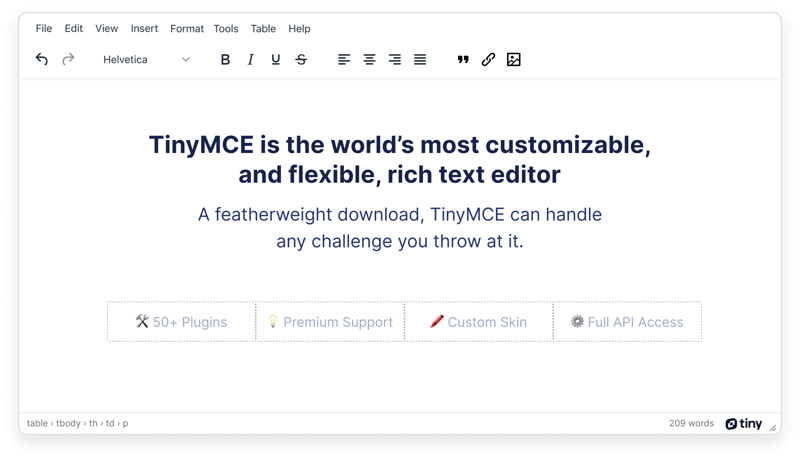
TinyMCE is one of the most powerful and flexible rich text editors out there. Whether you're building a web application or managing content for a website, TinyMCE provides a customizable, user-friendly solution that integrates seamlessly into your project.

In the project I’m currently working on, I decided to integrate TinyMCE to enhance the content editing experience for our users. ?
Its feature set is vast, including everything from basic text formatting to advanced embedding options for images, videos, and other media. TinyMCE supports a wide range of plugins that can be added to expand its functionality — for example, the enhanced code editor plugin that provides syntax highlighting and code folding. ?

Some standout features I used in the project:
The flexibility and ease of use TinyMCE offers is one of the reasons I love it. It’s great for building dynamic and interactive content editors! ?

One of the best things about TinyMCE is its support for multiple languages. ? Whether you're working with a global team or catering to different language speakers, TinyMCE makes it easy to localize the editor.
For instance, if you want to add support for Persian, you can easily download the language pack from here. After that, just include the language file in your project and set the language option when initializing the editor.
Check out the full documentation for localization here.
Once you've set up TinyMCE, don’t forget to log in to your account on the TinyMCE website, and add your domain to your API key settings. This will prevent any warnings from showing up inside the editor. ?
To get started with TinyMCE, you can install it via NPM. Here’s the package link: TinyMCE on NPM.
Run the following command to install it in your project:
bash npm install tinymce
The above is the detailed content of TinyMCE: The Ultimate Rich Text Editor for Seamless Content Creation. For more information, please follow other related articles on the PHP Chinese website!
 The latest ranking of the top ten exchanges in the currency circle
The latest ranking of the top ten exchanges in the currency circle
 What to do if the CPU usage is too high
What to do if the CPU usage is too high
 What currency is USDT?
What currency is USDT?
 How to set up hibernation in Win7 system
How to set up hibernation in Win7 system
 What are the java flow control statements?
What are the java flow control statements?
 Python online playback function implementation method
Python online playback function implementation method
 matlab colormap function usage
matlab colormap function usage
 Connected but unable to access the internet
Connected but unable to access the internet




